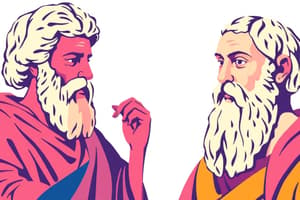Podcast
Questions and Answers
What are the key features of Ancient Greek political thought?
What are the key features of Ancient Greek political thought?
Key features include the emphasis on civic participation, the exploration of justice, and the development of various political systems like democracy and oligarchy.
How does Plato define justice in his works?
How does Plato define justice in his works?
Plato defines justice as a harmony where each part of the society performs its role effectively, contributing to the common good.
What is Aristotle's view on the nature of the state?
What is Aristotle's view on the nature of the state?
Aristotle views the state as a natural entity that emerges from the basic social unit of the family and serves the purpose of achieving the good life for its citizens.
What role does reason play in Aristotle's conception of political life?
What role does reason play in Aristotle's conception of political life?
In what ways did Plato and Aristotle differ in their views on justice?
In what ways did Plato and Aristotle differ in their views on justice?
Flashcards
Plato's Justice
Plato's Justice
Plato's concept of justice in society, emphasizing harmony and social roles.
Aristotle's State
Aristotle's State
Aristotle's study of the state and its ideal form, focusing on the practical.
Ancient Greek Political Thought
Ancient Greek Political Thought
Philosophical ideas about governance in ancient Greece.
Ancient Greek Philosophers
Ancient Greek Philosophers
Signup and view all the flashcards
Ancient Greek Political Thought - Core Concept
Ancient Greek Political Thought - Core Concept
Signup and view all the flashcards
Study Notes
Ancient Greek Political Thought
- Athenian democracy was a complex system of participatory governance.
- It featured direct forms of participation through assemblies, councils, and courts.
- Citizens held significant power in decision-making.
- Greek thinkers developed theories about the ideal state and citizen.
- Philosophers like Plato and Aristotle sought to understand the foundations of political order and justice.
Plato's Conception of Justice
- Plato explored the concept of justice through the allegory of the cave.
- He argued that true justice requires understanding the Forms, eternal and unchanging ideas.
- In Plato's Republic, a just society is characterized by a hierarchical order.
- It comprises three classes: rulers (philosopher-kings), guardians (warriors), and producers (workers).
- Each class fulfills its specific role, guided by reason and virtue.
Aristotle's View on the State
- For Aristotle, the state is a natural institution.
- It is the highest form of human association, essential for achieving a good life.
- He believed that human beings are inherently political animals.
- They possess the capacity for reason and language, enabling them to live in communities.
- Aristotle emphasized the importance of both individual and communal well-being.
Reason's Role in Aristotle's Political Thought
- Reason is central to Aristotle's political thought.
- It allows individuals to discern the good life and participate in political decision-making.
- Reason enables us to understand our place in the community and contribute to its well-being.
- Aristotle emphasized the role of education and moral development in shaping virtuous citizens.
Plato & Aristotle's Differing Views on Justice
- Plato believed that justice is grounded in the harmony of the three classes in society.
- He emphasized the role of reason and the philosopher-king in achieving justice.
- Aristotle viewed justice as a virtue of character, a disposition to act fairly and treat others justly.
- He emphasized the importance of law, custom, and political participation in promoting justice.
- Both Plato and Aristotle understood justice as essential for a stable and flourishing society but had different approaches to achieving it.
Studying That Suits You
Use AI to generate personalized quizzes and flashcards to suit your learning preferences.




